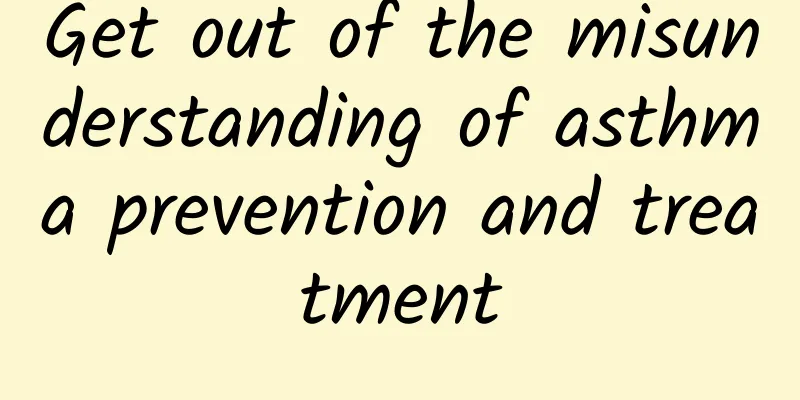Get out of the misunderstanding of asthma prevention and treatment

|
Author: Wang Wen, Chief Physician, Beijing Chaoyang Hospital, Capital Medical University Reviewer: Huang Kewu, Chief Physician, Beijing Chaoyang Hospital, Capital Medical University Bronchial asthma (abbreviated as "asthma") is a chronic airway disease. Standardized treatment and management can keep asthma symptoms under good control. At present, there are still some misunderstandings in the prevention and treatment of asthma. Only by getting rid of these misunderstandings and achieving precise prevention and treatment can the social burden brought by asthma be reduced. Figure 1 Copyright image, no permission to reprint Myth 1: Inhaled medications are addictive and should not be used for a long time Asthma is a "chronic inflammation of the airways". This "inflammation" is not the same as the inflammation caused by bacterial or viral infection that we usually talk about, and antibiotics are ineffective for treating it. Currently, the best drug for treating this "inflammation" is glucocorticoids. Compared with oral and intravenous hormones, inhaled hormone therapy can enable the drug to reach the local airways better, thereby exerting an "anti-inflammatory effect", and at the same time, adverse reactions will be significantly reduced. Therefore, both domestic and foreign guidelines for the diagnosis and treatment of asthma regard inhaled hormones as the preferred treatment option for asthma. Figure 2 Copyright image, no permission to reprint Inhaled glucocorticoids have the characteristics of small dosage, direct action on target organs (sites of airway inflammation), "twice the result with half the effort" anti-inflammatory effect and few adverse reactions. The hormone used for treatment is completely different from systemic glucocorticoids, but a local hormone, which is safe for long-term use. Therefore, the inhalation administration method for the treatment of asthma is safe and effective, and will not cause the so-called "addiction" problem, especially for those patients who need to use glucocorticoids by inhalation for a long time. Usually, it does not cause obvious systemic adverse reactions, which is different from systemic medication. However, it should be noted that the dose of hormones cannot be increased blindly, and the greater the dose of inhaled hormones, the better the efficacy. Asthma patients with poor symptom control should not blindly increase the dose of hormones, but should adopt a combination of medication. Long-term nebulized inhaled glucocorticoids are only suitable for aggravated symptoms and cannot be used for long-term maintenance treatment. Myth 2: Asthma can be “cured” Asthma cannot be cured at present. As long as it can be treated in a standardized and long-term manner, 80% of asthma patients can get long-term and good control and live, work and study like normal people. Asthma is a chronic airway inflammation. Even if it is given adequate short-term treatment, the symptoms will not subside immediately, but may exist for a long time (even lifelong). Therefore, patients need to take medication regularly for a long time to achieve the purpose of "long-term anti-inflammatory" and avoid asthma attacks. In addition, the treatment plan should be constantly adjusted according to the control level of asthma. With the advancement of treatment methods and the launch of new biological agents, refractory asthma is no longer "refractory" and severe asthma is no longer "severe". Active treatment can also be well controlled. Myth 3: All asthma patients will wheeze, and if they don’t wheeze they don’t have asthma Regarding asthma, many people still have the impression that patients in movies and TV shows will have "shortness of breath and difficulty breathing". In fact, these symptoms are typical manifestations of acute asthma attacks. Some patients only cough without wheezing and have continuous dry coughs. Some patients don't even cough, but just feel chest tightness and discomfort. These are all manifestations of asthma. Chest tightness variant asthma is also a special type of asthma, while cough variant asthma is mostly manifested as night cough and irritating dry cough. Cough is its only or main clinical manifestation. Patients do not have obvious wheezing, so it is easy to be misdiagnosed as bronchitis. 30% to 40% of patients with cough variant asthma will eventually progress to typical asthma, and early inhalation of glucocorticoids can control inflammation and effectively reduce the probability of cough variant asthma progressing to typical asthma. Myth 4: Relief medication is only used during acute asthma attacks, and is not necessary at other times. Asthma is a chronic disease that cannot "subside" on its own and is prone to recurring attacks. Therefore, self-management of asthma is necessary. Not taking medication on a regular basis and only using emergency relief medication during acute attacks is not conducive to the control of asthma, but is an important factor in the recurrence and aggravation of asthma. Asthma is a disease that can occur at any age. Many people think that children's asthma symptoms can gradually disappear with age, which is a common misconception. In fact, for children with severe asthma who do not receive standardized treatment, asthma symptoms can persist into adulthood or old age, and can develop into chronic obstructive pulmonary disease at an early stage; for children with milder conditions and better control, although asthma symptoms can be relieved on their own after physical development, 50% of patients will still have the disease again. From this point of view, it is important to manage and monitor asthma. Figure 3 Copyright image, no permission to reprint Myth 5: Asthma is contagious Environmental factors have a great impact on asthma patients. Therefore, actively identifying allergens or other triggering factors related to asthma attacks in patients is of great significance for the prevention and treatment of asthma. Some asthma patients with clear asthma-causing factors can be cured without medication as long as they can effectively avoid contact with these asthma-causing factors. When symptoms are well controlled, behaviors such as exercise will not cause patients to experience asthma symptoms. In addition, although viral respiratory infections (such as influenza, common colds, etc.) can cause asthma attacks, asthma itself is not contagious. Asthma sometimes attacks in clusters, which are mostly related to genetic factors. Especially for asthma patients in the acute attack stage, exercise can also induce or aggravate asthma symptoms, so such patients are not recommended to perform exercise training. However, patients with stable asthma are still encouraged to engage in regular physical activities, which can help improve cardiopulmonary function. |
<<: Understanding HPV Vaccine in One Article
>>: There are certain rules for taking antihypertensive drugs. Are you taking them correctly?
Recommend
What to do if you don't have your period in the second month after abortion
In our lives, especially in the lives of female f...
Female urethra opening sharp wet picture
As we all know, caring for women's health is ...
What should pregnant women do if they eat papaya?
We all know that you cannot eat papaya during pre...
Why are my nipples always itchy?
If your nipples are always itchy, it is mostly du...
Four-step palpation method for obstetrics
The four-step palpation method is the most common...
Pictures of cervical erosion of the first, second and third degrees
The symptoms of first, second and third degree ce...
What are the harms of vigorous exercise during menstruation?
When it comes to menstrual issues, female friends...
Nipple discharge on bra
Some women may encounter an embarrassing problem ...
Does a swollen belly mean I’m pregnant?
Under normal circumstances, if a woman is pregnan...
Female left side waist pain
If women do not pay attention to their physical h...
Why don’t clams open after being boiled for a long time? (They are already dead before being boiled)
...
The best time for women to have a prenatal check-up
We are planning to have a baby, but we don’t know...
7 ways to prevent breast sagging
Breast sagging can make a woman's figure a li...
Can pregnant women eat spinach during confinement?
Many pregnant women during confinement are not su...
What happens if there is blood in the leucorrhea during breastfeeding? The real situation is this
If women have leucorrhea with blood during breast...









